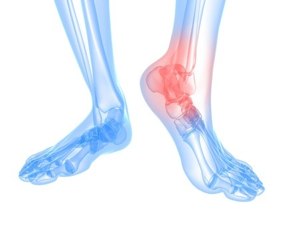
Arthritis is a disease of the joints which causes them to become inflamed and stiffen. The three main types which affect the feet are Osteoarthritis, Rheumatoid arthritis and Gout.
All three forms of arthritis can benefit from chiropody care. State Registered Chiropodists will be able to adapt your existing footwear with orthoses or other appliances, which fit easily into your shoes and help redistribute pressure away from the affected parts.
Your podiatrist can also provide protective shields for your toes, or padding to relieve pressure and reduce friction. Any secondary problems, like ulcers or corns, can also be treated.
Osteo (bone) arthritis, the most common type, is known as the 'wear and tear' complaint. It usually affects one particular joint in areas which are subject to over-use, such as the knees and hips. It can affect any joints in the feet, but the big toe is the most common one.
Wear and tear at the ends of the bone causes the cartilage to erode, and the bone ends may begin to fuse, resulting in stiffness and aching in the joints. Bunions or other deformities of the big toe are a sign of 'over-use' and osteoarthritis may result. It can also follow a bad sprain to the foot, or a bone fracture, or where the foot is under too much stress.
Stiffness and pain in the joint is the first sign of osteoarthritis. Continued use of the joint makes it stiffen up further until it refuses to move at all.
To help this condition, try to avoid putting the foot under stress in the first place by wearing the correct footwear, which will help the foot maintain its correct shape. Sensible shoes with low heels and lace-up fastenings, which keep the heel in place and stop the toes from being pushed into the front of the shoe are best. Shoes with a stiff sole may also be of help.
If the arthritis has already developed and your joint is painful, use rest, ice packs and anti-inflammatory creams to help. Your GP may prescribe anti-inflammatory tablets for you, too. Continue wearing the right shoes, which should be roomy enough to accommodate any swelling.
Rheumatoid arthritis is a systemic disease of the whole body, which particularly affects the joints and muscles in the foot, rather than one specific joint, as in the case of osteoarthritis. The insides of the joints become inflamed, swollen and stiff, and as the disease progresses the bones may move out of their correct positions. The arch of the foot may slowly collapse and flatten and the toes may draw back into a claw-like shape. Small joints of the hands and feet are the first to be affected, but eventually all joints may suffer changes.
Rheumatoid arthritis is a progressive disease which can start in childhood, but is more likely to begin in middle age. Twice as many women as men develop this complaint, which is described as being an auto-immune disease, and can be inherited. Some authorities suggest it could be the result of a virus.
The joints become painful, swollen, and feel warm. The soles of the feet are tender and you may feel as though you are 'walking on pebbles'. Corns or ulcers may develop and resistance to infection is diminished, particularly if you have been given a course of steroid therapy. The stiffness is worse in the morning or after a period of inactivity.
To help this condition, make use of sensible shoes which are deep enough to accommodate the swelling, and hold the heel in place. Regular visits to a State Registered Chiroodist is a good idea, so that the development of the disease can be monitored, with the aim of reducing the amount of deformity that occurs. Aspirin may reduce pain and swelling, but your GP will be able to advise you and prescribe appropriate anti-inflammatory drugs.
This condition, which is the result of an imbalance of uric acid in the body, affects more men than women. The main symptom is waking up in the middle of the night with an acute, throbbing pain in the big toe, which is also swollen. Usually only one of the big toes is affected.
The pain lasts for around three or four hours and will then subside and usually not return for a few months. It can be controlled by drugs, which your GP will be able to prescribe. The application of ice or cooling lotions will help during an acute phase.
